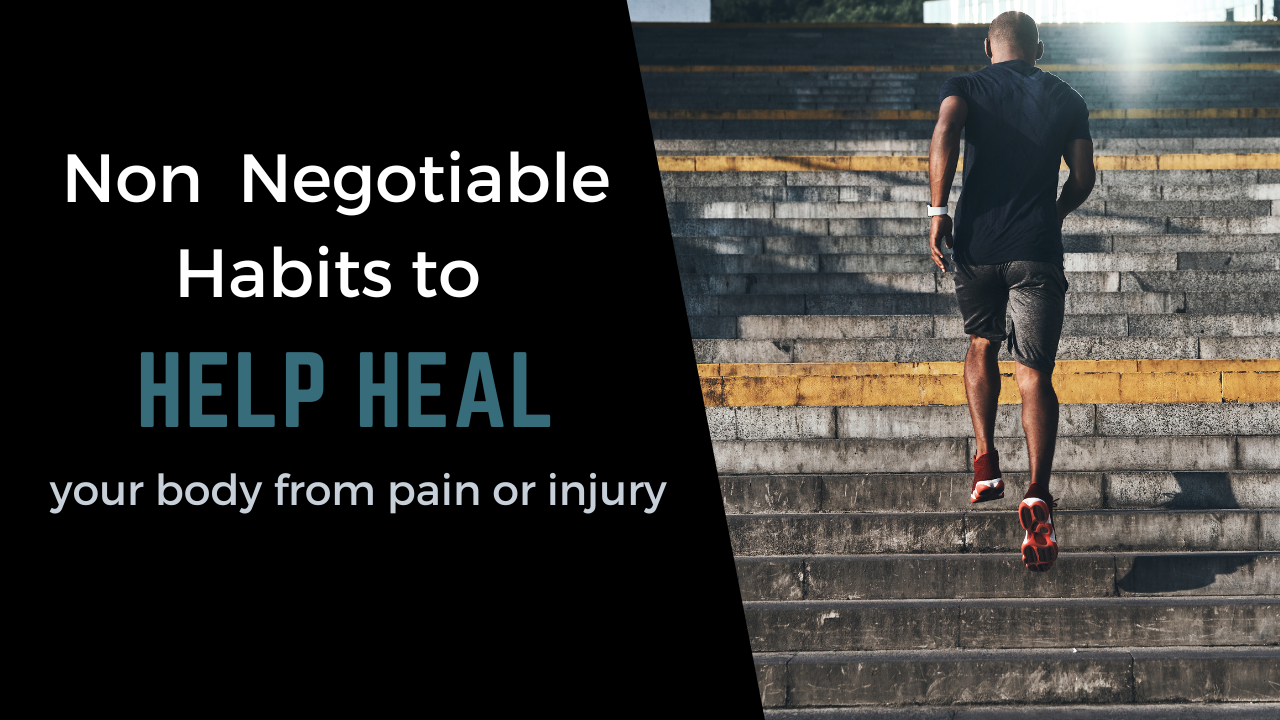Non Negotiable Habits to Help Your Body Heal
Jun 09, 2025
As a Physical Therapist, I am obviously heavily leaning on movement and exercise to help clients recover from injury. But as part of my plan of care, I discuss things outside of the gym and physical therapy that will help clients recover faster.
Surprisingly to many, my guidance does not involve buying expensive supplements or fancy gadgets. It does, however require some lifestyle changes that may be inconvenient in which case the question then becomes- how serious are you about recovery?
For those that are serious, these things that are done outside of physical therapy will help you create an environment in which healing can effectively occur so that you can fully recovery from injury, decrease chronic joint pain/dysfunction, reach higher levels of performance, and reclaim your health.
First and foremost, I recommend decreasing nicotine, tobacco, an alcohol as much as possible preferably with complete cessation. Nothing beneficial to the body comes from these substances. They are intended to give the mind a quick fix at the cost of the body.
Nicotine and tobacco decrease are scientifically proven to decrease healing times for most all musculoskeletal injuries. The mechanism for this is vasoconstriction which means the blood vessels narrow. Vasoconstriction causes decreased blood flow, decreased blood flow means delayed healing. This applies to cigarettes, vape, dip, zyn pouches... all of it. Cut it down as much as possible and then eliminate it completely.
As for alcohol, I firmly believe there isn't much worse for the body or mind. It affects our actions, intentions, disrupts our sleep and priorities, and causes inflammation in the body. If your focus is on healing, there should be no space in your life for alcohol. This is another substance that provides a quick fix for the mind at the expense of our body.
Oh and by the way, alcohol is a leading preventable cause of at least 7 different types of cancer. Don't believe me? Please refer to this recently published ARTICLE
Next up is being mindful of the food you are consuming. Healing is a time to double down on nutrition. I'm not talking diets or cutting calories or carbs or whatever else is trendy. I'm talking focusing on whole foods and eliminating as much processed sh*t as possible.
Cook at home as much as possible. Limit meals out to no more than once a week (your bank account will thank you for this as well).
Take the time to prep your meals ahead of time if your schedule gets hectic during the work week.
You want to focus on eating as clean as possible. Meats, fruits, veggies, and good cars like potatoes and rice.
You also want to make sure you are getting adequate protein. Often times during rehab, we are seeking to increase strength which can only happen if you are consuming enough protein.
If nutrition feels overwhelming to you, I recommend consulting with a registered dietician who specializes in sports and working with athletes. I am happy to refer you to trusted colleagues, please reach out if this interests you.
Lastly, regardless of your injury you need to stay active.
What gets many people on this is if they are unable to do their desired fitness activity or their normal fitness activity, they simply stop moving all together.
We will likely have to modify things. And they may mean that you step outside of your comfort zone and do things that either aren't your favorite or you have never tried. In the 15 years that I have been a physical therapist, there have only been a handful of times where there were no appropriate forms of exercise. And those individuals were in critical condition after an accident or something sinister along those lines.
For most musculoskeletal pains or injuries we can still find something for you to do. Even if it is simply walking every day.
While there are many physiological benefits to staying active to include glucose and blood sugar regulation, weight management, cardiovascular maintenance etc.. my primary reason is to preserve the mind.
As athletes, we can go crazy if we can't exercise and it is easy to find our thoughts in dark places. When your body hurts, an injury has you sidelined, and your physical fitness slips it is really easy to get down and depressed. For this reason alone, my priority will always be to work with an athlete to find ways to stay active as the body heals.
This is a little different than my typical blog posts, but it is a topic of conversation that has come up several times in the past week so I wanted to put my thoughts and rehab approach to this out there.
As always, if you have any questions or simply want to chat shoot me an email at [email protected]
Yours in health,
Jamie 'Doc Mraz'

